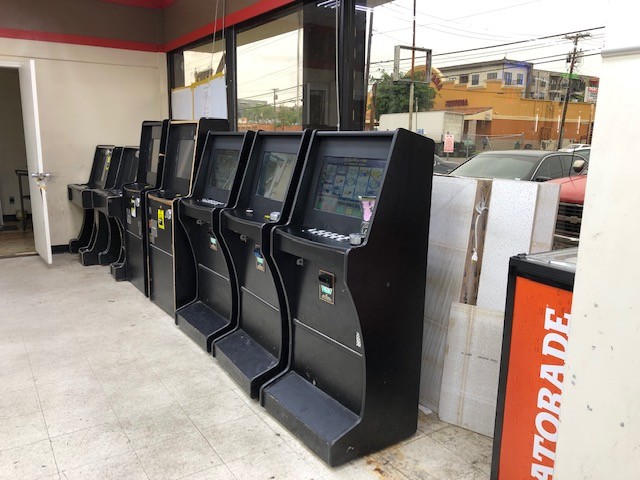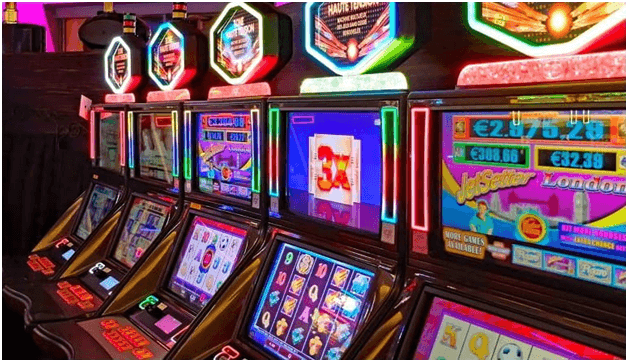The state's 2017 gambling expansion law contained a broadened definition of slot machines that included the games of skill, which some state officials interpret as making them legal only in. Lawmakers two years ago imposed a system they said would finally clean up an industry operating what are officially known in Georgia as coin-operated “amusement” machines — slot machines by any.


Video Gambling: Georgia Jackpot Or Bust?

Alabama
|
Is It Legal To Own A Slot Machine In Georgia Tech
Bill Passes Georgia House Regulating Gaming Machines by Pam O’Dell Governor Nathan Deal’s bill to regulate and tax class B gaming machines passed the Senate last Thursday, 35 to 16. Class B machines are the video games often lining the back wall of convenience and liquor stores. The bill has passed the House and will likely be signed by the Governor. It was evident from hours of debate that few Senators liked the bill. However, a no vote for a bill belonging to the Governor usually has considerable political consequences for any legislator. Opposing Senators from both parties created an atmosphere of confusion and obstruction, throwing up more than ten amendments, intended to communicate their displeasure, before finally voting along party lines. HB 487puts the Georgia Lottery Corporation in charge of enforcing gaming law and gives the lottery up to ten percent of the proceeds of Class B machine profits to fund colleges and Pre-K programs. Senator Josh Mc Koon, R-Columbus, sponsored amendment seven. Despite his short tenure in the Senate, Mc Koon has become the General Assembly’s most out spoken advocate for transparency in government. The amendment (which threatened to outlaw class B machines entirely) was supported by a majority of the chamber before the Lieutenant Governor Casey Cagle called for a reconsideration vote. According to Senator Tommie Williams, R-Lyons, class B machines have been historically hard to regulate (let alone tax) and have lead to environments which breed crime. Williams, speaking to the entire chamber, made it clear that the machines should be made illegal, not legitimized and taxed. 'The GBI [Georgia Bureau of Investigation] wants them done away with. A lot of people’s lives are being destroyed by video poker. People have been playing these machines when they needed to be buying groceries.” The former President Pro Tempore of the Senate recalled numerous efforts to limit both the types and amounts of giveaways but stated that legislative remedies never worked. Most difficult to stop are the cash payouts, which require continued surveillance and multi-jurisdictional law enforcement as well as the resources of local prosecutors to control. Numerous senators expressed doubts about the Lottery Corporation’s ability to enforce the law. Senator Hardie Davis, D-Augusta remarked, 'If the lottery corporation comes into my store, I am not going to be that concerned. But if the Department of Revenue comes in my door, now you have my attention. But, at the end of the day, even that didn’t work. They were never able to enforce the law.” Speaking from the well, Senator Vincent Fort, D-Atlanta called the bill 'an industry bill” with 'carve-outs” for each party. 'This bill will effectively turn the lottery corporation into a gambling Commission.” While Senators gazed at the letter signed by the CEO of Flash Foods (obviously distributed by the convenience store lobbyist) supporting the bill, those loyal to conservative church groups took their place at the well. Pat Tippet, co-founder of Georgia Conservatives in Action, referred to the machines as 'predatory gambling machines.” Tippet believes there is no distinction between such machines and a gambling casino 'except, at least in a casino, the machines aren’t right next to the bread and milk.” Ray Newman, representative of the Georgia Baptist Convention, worries that the arrangement will result in an already out- of- control industry. 'The reality is, we have become addicted to and are very dependent on the money from the lottery for HOPE and pre-k programs in our state. When the revenues do not add up as they are promised, it is important to find other sources of revenue to flow into the program.” |